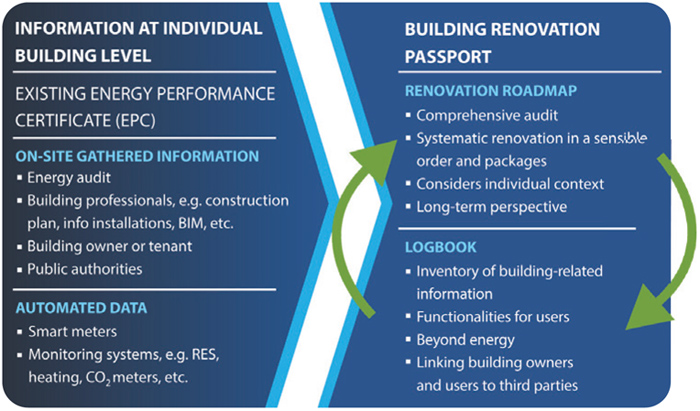 We would never build a house without a plan, so why renovate it without one? The iBRoad project (2017-2020) developed and tested a set of tools and methods to guide and support building owners on their unique renovation paths towards energy efficient homes.
We would never build a house without a plan, so why renovate it without one? The iBRoad project (2017-2020) developed and tested a set of tools and methods to guide and support building owners on their unique renovation paths towards energy efficient homes.
Renovating a building can be complex, expensive and time consuming. For building owners, the lack of knowledge about what to do, in which order to implement renovation measures, and how to finance them, are just some of the main obstacles to improving the energy performance and overall status of their building.
The iBRoad project (2017-2020) worked on lifting these barriers for building owners, increasing the rate and depth of renovation, and thus contributing to the Renovation Wave1, by developing a Building Renovation Passport for single-family houses, testing it, and proposing measures to support its uptake by the European markets. This article briefly summarises iBRoad's results and experience.
iBRoad's Key Exploitable Results
A concept for the building renovation passport (individual building renovation roadmap plus logbook) based on existing initiatives. The iBRoad project developed – and tested in several countries – a concept for the building renovation passport as a modular framework comprising the renovation roadmap and logbook, both centred around an individual building: (a) A plan – the individual Building Renovation Roadmap – to gradually renovate a building over a long-term horizon (5-30 years). The plan is tailor-made for the building and its building owner. (b) A repository of information – the Building Logbook – able to include building photos and plans, energy consumption and production of the building, executed maintenance works, etc. The logbook includes the time dimension, so one is able to store successive 'snapshots' of the building state.
A flexible hybrid data structure for building information (common and country-specific).
The iBRoad project recognised that building information includes parameters that are common across the EU, and others which are substantially differentiated between countries. To deal with this challenge, iBRoad developed a hybrid data structure – both at the conceptual and at the software tools level – covering both EU-shared and country-specific parameters. This allows the iBRoad approach to be adapted and implemented in all EU countries and possibly beyond.
An energy audit methodology and training, leading to the development of the roadmap.
iBRoad's energy audit methodology is a step-by-step process to assess the state of a building, converse with the owner and comprehend their perspective, and develop a customised renovation roadmap.
Two functional software tools, iBRoad-Log and iBRoad-Plan.
iBRoad-Log, the digital building logbook, and iBRoad-Plan, the programme used to generate the renovation roadmap, are powerful and fl exible software tools that can be adapted and deployed by countries, regions, local administration, and other organisations to support implementation of their building policies.
Cost calculation methodology.
Considering that cost concerns
represent a critical factor that can
determine the decision to renovate
(or not), iBRoad developed a cost
calculation methodology to help
energy consultants in enabling
building owners to base their
decisions on reliable cost and return
estimates.
Public opinion and stakeholder
analysis.
The iBRoad project
included extensive end-user research
and stakeholder feedback on its
background, concepts and tools.
Such analysis helped in choosing
paths and taking decisions during the
development of the iBRoad tools and
methods, and remains valuable for
future undertakings.
Policy suggestions.
The iBRoad
concept unfolds its maximum impact
when embedded into concomitant
and supportive policies, ranging
from informational and economic
to regulatory; the project's outputs
include such policy proposals for
relevant topics.
All iBRoad tools and methods are
characterised by modularity; an
authority or other organisation can
choose and adapt the ones most
suitable for their specific situation
without depending on the rest.
For example, iBRoad tested both
the roadmap and the logbook
in Bulgaria, Poland, Portugal and
Ireland, while only the logbook in
Germany, a country that has already
implemented building roadmaps
known as iSFP (Individueller
Sanierungsfahrplan für Wohngebäude)
– the iSFP was in fact one of the
frontrunner initiatives analysed
when the iBRoad concept was under
development. Similarly, an authority
can choose to adopt the iBRoad audit
methodology, while developing or
adapting its own tools for collecting
information and generating the
renovation roadmaps.

Positive experience
As per feedback received through
surveys and meetings with
stakeholders, the results of iBRoad's
pilot testing have been very positive
– for both building professionals and
owners – and supportive of largerscale
adaptation and deployment.
Of particular interest is the case
of Ireland which was not one of
the iBRoad project's original pilot
countries, and where iBRoad was
tested thanks to collaboration
with IGBC, the Irish Green Building
Council; the relevant report2 therefore
represents an external view at iBRoad
and its perspectives in the context of
a specific country.
The future has a plan
iBRoad has contributed its share
to the rising interest on Building
Renovation Passports, logbooks and
roadmaps, with its reports being
downloaded more than 27,000 times
from the project website alone.
At iBRoad's final conference, such
tools have been called potential "game
changers"3 for the deep renovation
of buildings in Europe. They already
represent much more than proofs
of concept or isolated initiatives. In
the years since the iBRoad project's
implementation began, a multitude
of such efforts has sprung up around
Europe. Equally importantly, such
tools are being integrated in the
greater policy context. In Germany,
the new funding scheme BEG
supporting building effi ciency, now
rewards building owners with an
individual building roadmap (iSFP)
by providing 5% more funding. And
with Building Renovation Passports
becoming increasingly relevant for
national Long Term Renovation
Strategies (LTRS), Portugal's recently
unveiled LTRS includes direct
reference to the paradigm developed
by the iBRoad project.
While much of economic life has
been slowed down due to COVID-19,
even dealing with the effects of the
pandemic can benefit from planning
building renovations right4. The
Renovation Wave should not wait.
1. While iBRoad was conceived and largely implemented before the announcement of the Renovation Wave, it is fully fit for the latter's purpose.
2. Introducing Building Renovation Passports in Ireland: Feasibility Study https://www.igbc.ie/resources/introducing-building-renovation-passports-in-ireland-feasibility-study/
3. iBRoad final conference summary https://ibroad-project.eu/downloads/conference_summary
4. The iBRoad concept for Building Renovation Passports after COVID-19, European Energy Innovation, Summer 2020
The iBRoad project has received funding from the European Union's Horizon 2020 research and innovation programme under grant agreement No 754045.
The sole responsibility for the content of this article lies with the author. It does not necessarily reflect the opinion of the European Union. Neither
the EASME nor the European Commission are responsible for any use that may be made of the information contained therein.